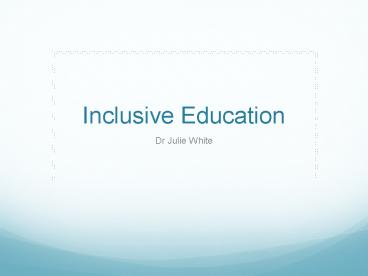Inclusive Education PowerPoint PPT Presentation
1 / 28
Title: Inclusive Education
1
Inclusive Education
- Dr Julie White
2
As a teacher.
- What do you expect you
- might you have to deal
- with?
3
Overview
- Deficit, difference, diversity
- The language of disability
- Inclusive educational practices
- And you?
4
Deficits
- Is the cup HALF FULL or HALF EMPTY?
5
GLEE CLUB
- http//www.examiner.com/tv-in-national/glee-stars-
lea-michele-jane-lynch-following-lady-gaga-with-co
mic-book-1 - Check out this for Glee Cast picture
- What do you notice about the contents of this
picture?
6
Deficits
- Visibility
- Support
- Enabling practices
7
Visible
8
Invisible
- Diabetes
- ADHD
- Epilepsy
- Chrons Disease
- Cystic Fibrosis
- Depression
- Chronic fatigue syndrome
- Cancer
- Haemophilia
- Lupus
- Eating disorder
- Asthma
9
World Health Organization
- Disabilities is an umbrella term, covering
impairments, activity limitations, and
participation restrictions. - Thus disability is a complex phenomenon,
reflecting an interaction between features of a
persons body and features of the society in
which he or she lives. - http//www.who.int/topics/disabilities/en/
10
What difference does language make?
- Cripple
- Spastic
- Retarded
- Mongoloid
- Lunatic
- Apartheid
- Nazis
- Stereotyping
- Labelling
- Rights
11
What inclusive practices might you use?
- Speak with parents
- Encourage and welcome
- Be sensitive in your planning so that you include
rather than exclude - Dont think that the answer is just in resources
- Every person is different whatever their
disability or health issue - Remember that standards (e.g. VELS) are made up
by bureaucrats children learn at their own pace
12
What can this child do?
13
How can I help this child to belong?Pictures of
three children shown
14
How can I help this child to learn and to achieve
their full potential?
15
Potential
- How do I know what their potential is?
- Do I have the right to decide?
16
Myth No. 1
- Probably the most widely-held myth about
teaching students with a disability is the belief
that a detailed knowledge of the childs
disability is needed before a teaching programme
can be commenced. Teachers often say But I know
nothing about Down syndrome or I havent
studied cerebral palsy-how could I teach that
child? - Foreman, P. (Ed) (2001) Integration and
Inclusion in Action (2nd ed.) Southbank, Nelson,
p. 25.
17
Education Institute
- Royal Childrens Hospital, Melbourne
- Phone 9322 5100
- Website
- http//www.rch.org.au/edinst/index.cfm?doc_id103
85
18
Overrepresented groups
- Alexander, R. (Ed.) (2010) Children, their
World, their Education. Final Report and
Recommendations of the Cambridge Primary Review.
London, Routledge. - See chapter 8 Children, Diversity and Equity.
19
Over represented groups
- Boys (1 in 40, girls 1 in 100)
- The poor
- Particular ethnic groups. e.g Black Carribean
children attributed to low teacher expectations - Alexander (2010, p. 115)
20
In Australia
- In Australia, we know that boys from particular
postcodes (poor ones) are often diagnosed as
having ADHD and subsequently medicated on the
referral of the primary teacher. - And we know that the poor suffer more health
issues (e.g. Indigenous Australians)
21
See Alexander Ch 8
- How the education system exacerbates inequalities
- Ethnicity
- Diversity
- Difference
22
Pedagogy
- Pedagogy is the heart of the enterprise. It
gives life to educational aims and values, lifts
the curriculum from the printed page, mediates
learning and knowing, engages, inspires and
empowers learners or sadly may fail to do so. - Alexander (2010, p. 307)
23
Pedagogy
- Pedagogy determines how teachers think and act.
Pedagogy affects students lives and
expectations. Pedagogy is the framework for
discussions about teaching and the process by
which we do our jobs as teachers. Pedagogy is a
body of knowledge that defines us as
professionals. - Anderson, P. M. (2005) The Meaning of
Pedagogy, in Kincheloe, J. L. Classroom
Teaching An Introduction, New York, Peter Lang,
pp. 53-69.
24
Pedagogy
- Pedagogy demands and constructs complex social
relationships. Through exchange, pedagogy becomes
productive, constituting the forms of knowing,
the conditions for knowing, and the
subjectivities of knowers. Pedagogy points to the
agency that joins teaching and learning. - Britzman, D. (2003) Practice Makes Practice A
Critical Study of Learning to Teach, New York,
State University of New York Press. P. 54.
25
Your pedagogy
- As a teacher, what are your values and beliefs
in relation to inclusion and disability? - How will you enact your pedagogy?
- Prompts
- Social justice
- Rights of individuals
- Schools should sort out the students from strong
to weak - This is not my problem
26
My own research
- 5 years
- 10 young people with chronic illness
- All over Victoria
- Visits in their homes long conversations
- Gave them cameras and video cameras
- Interested in getting their perspectives on
identity, connection and education - http//www.edfac.unimelb.edu.au/keepingconnected/
27
3 useful websites
- http//www.chronicillness.org.au/invisible/
- http//www.education.vic.gov.au/healthwellbeing/we
llbeing/disability/default.htm - http//www.primaryreview.org.uk/
28
Advice
- Read a lot
- Be critical of everything
- Ask lots of questions
- Look for complexity not reductionism.
- Education is a complicated business.
- Think a lot
- Work out who you are and what you stand for (as a
teacher) this year while youre an education
student

